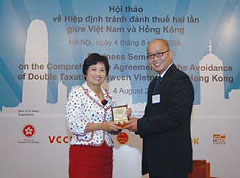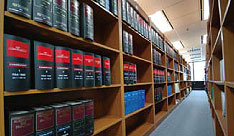 2008-09 was an eventful year for the Inland Revenue Department (IRD). Given the challenging circumstances we faced, the results achieved by the members of our staff team - who continued to work with their typical diligence and perseverance - were most encouraging. 2008-09 was an eventful year for the Inland Revenue Department (IRD). Given the challenging circumstances we faced, the results achieved by the members of our staff team - who continued to work with their typical diligence and perseverance - were most encouraging.
Reflecting Hong Kong's strong economy in 2007-08, earnings and profits tax collections in 2008-09 rose to a record high of $146.1 billion, a year-on-year growth of $12.4 billion or 9.3%. The number of taxpayers paying salaries tax increased to 1.42 million and corporations paying profits tax to 80 thousand. However, the outbreak of the global financial crisis in September 2008 caused a sudden contraction in the stock and property markets. Stamp duty collection dropped by 37.6% to $32.2 billion. Tax collection work also faced unforeseen difficulties, pushing the tax in arrears to a higher level. Overall, the Department collected $191.5 billion in total, a reduction of $9.2 billion or 4.6%.
In early 2008, Hong Kong enjoyed a prosperous economy and a bullish market. The IRD total collections reached an all-time high of $200.7 billion in 2007-08. Under the Government's initiative of leaving wealth with the people, IRD implemented a package of tax concessions. The economic downturn later in the year, however, hit many trades and industries. We took immediate steps to enhance our service, including the launching of hotlines for applications to holdover provisional tax and to pay tax by instalments. The number of provisional tax holdover applications climbed to 60 thousand for salaries tax and 8 thousand for profits tax in the year, nearly double the respective figures of the previous year. IRD has always responded promptly to the ups and downs in economic cycles and delivered commendable results, thanks to our dedicated staff and flexible and effective operating systems.
IRD has long placed great emphasis on communicating with taxpayers, the business sector and international bodies. We are committed to keeping abreast of changes in the general business environment, the operations of market participants and the peculiarities of different trades and industries. We hold regular meetings with the Hong Kong Institute of Certified Public Accountants, the Joint Liaison Committee on Taxation and the User's Committee for IRD's Performance Pledge. We also contact at intervals with trade associations, professional bodies, overseas and our Mainland counterparts, and international economic and trade organisations. Through these various channels we aim to familiarise ourselves with external developments and, where appropriate, implement responsive improvements to the Hong Kong tax system.
To enhance the public's understanding of our policies and practices, we issue Departmental Interpretation & Practice Notes on tax topics from time to time, and these are uploaded on the IRD web site. We keep our tax work highly transparent. Our web site is frequently updated and carries a full volume of information. We wish to facilitate taxpayers in understanding their tax obligations, and taking the relevant tax factors into consideration in their business decisions.
The Hong Kong tax system is renowned for being simple, low-rated, and based on the territorial source principle. The durability of this tax system is a reflection of the community's work in fostering a prosperous and stable environment, the prudent fiscal policies in keeping public expenditure within our means, and the high degree of tax compliance by our taxpayers. IRD maintains a neutral position when applying the law, treating all taxpayers alike, to facilitate fair competition. The neutrality or fairness of our tax system would be undermined if a different assessment basis or concession is allowed to a particular industry. It would be unfair to other industries, and make the Hong Kong tax system unpredictable.
The Inland Revenue Ordinance gives taxpayers the right of objection and appeals as a legal channel to handle disputes. Decisions handed down by the Board of Review and the Courts provide guidance to IRD officers in their interpretation and administration of the law.
 On the international front, Hong Kong has been actively seeking to build a network of agreements for the avoidance of double taxation with our major trading and investment partners. We have signed comprehensive double taxation agreements with Belgium, Thailand, Mainland China, Luxembourg and Vietnam. These treaties help to boost cross-border economic activities and protect the tax revenue of the contracting parties. Situations of double taxation can be avoided and traders and investors will be better able to assess accurately their tax liabilities. With such benefits at hand, Hong Kong is keen to further expand the network. On the international front, Hong Kong has been actively seeking to build a network of agreements for the avoidance of double taxation with our major trading and investment partners. We have signed comprehensive double taxation agreements with Belgium, Thailand, Mainland China, Luxembourg and Vietnam. These treaties help to boost cross-border economic activities and protect the tax revenue of the contracting parties. Situations of double taxation can be avoided and traders and investors will be better able to assess accurately their tax liabilities. With such benefits at hand, Hong Kong is keen to further expand the network.
At the same time, the subject of "tax havens" has attracted much attention internationally. In contrast to those typical tax havens, Hong Kong's tax law is clear and unambiguous. We have effective anti-tax avoidance provisions and we enforce our tax law strictly. We never provide special tax concessions for the sake of attracting foreign capitals. We do not have laws protecting bank secrecy. We fully support the Organisation for Economic Co-operation and Development (OECD) in enhancing tax transparency. Therefore, Hong Kong is definitely not a tax haven, and should not be compared with those jurisdictions which seek to attract tax evading capitals through nominal tax rates, complicated and opaque tax rules, as well as bank secrecy laws. I was very happy to note that the OECD has commended Hong Kong's transparent tax system, and our efforts in complying with international standards on exchange of information.
 Further advances on this front were foreshadowed when the Financial Secretary announced in the 2009-10 Budget that legislative amendments would be put forward to enable Hong Kong to align with OECD's latest standard on exchange of tax information. These would not only help the expansion of Hong Kong's network of double taxation agreements, but also significantly enhance Hong Kong's position as a transparent tax jurisdiction. Further advances on this front were foreshadowed when the Financial Secretary announced in the 2009-10 Budget that legislative amendments would be put forward to enable Hong Kong to align with OECD's latest standard on exchange of tax information. These would not only help the expansion of Hong Kong's network of double taxation agreements, but also significantly enhance Hong Kong's position as a transparent tax jurisdiction.
The Mainland's rapidly expanding economy and the changes taking place in global trading and financial markets are presenting both great opportunities and challenges to Hong Kong. Our tax law and tax administration have served us well in the past, but would need to evolve with the time. I am confident that IRD will build on its past good work and strive for even better results. As per our vision statement, we aim to be an excellent tax administration that plays an important part in promoting Hong Kong's prosperity and stability.
Last but not the least, I would like to express my heartfelt thanks to all taxpayers and members of the professions, the business community and organisations in the public and private sectors for all the support and advice they provided in the past years. Without their assistance IRD would not have been able to achieve as much as it has! Motivated by our slogan, "Tax by the law Service from the heart", we will, as we go forward, continue working with our partners to serve the people of Hong Kong in an exemplary manner.
LAU MAK Yee-ming, Alice, J.P.
Commissioner of Inland Revenue
|